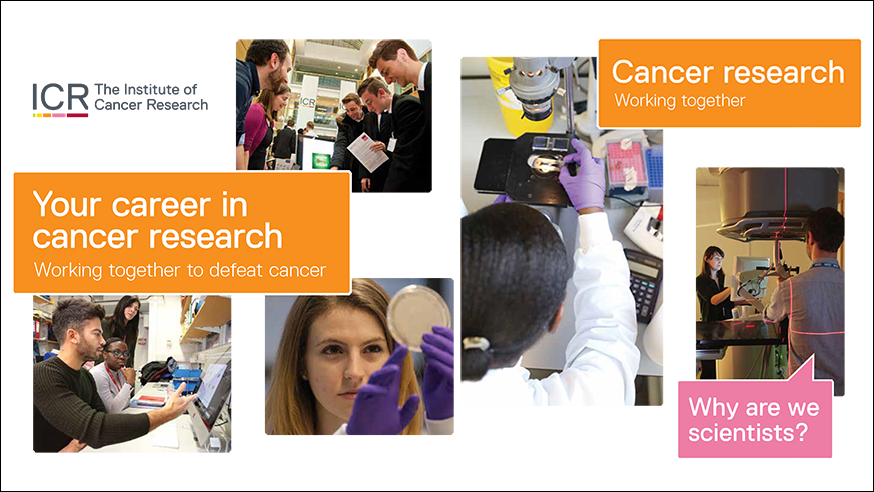
The booklet de-mystifies careers in cancer research, showcasing the breadth of careers available and sharing practical advice for those thinking about studying science.
If we’re going to make the discoveries that will defeat cancer, we have to commit to supporting and inspiring the next generation of cancer researchers. The ICR highlighted this recently in Reaching out: our public engagement strategy (PDF, 914KB), where we commit to making young people aware of the opportunities for careers in science.
Many ICR staff and students already volunteer their time to attend school science festivals and career events. After these events, we often heard that they wished they had something to give to the young people they met, to support and reinforce their positive messages.
This insight inspired a project to address this feedback, which was supported by the ICR’s Public Engagement Forum – a group of researchers and clinical academics representing all research specialisms of the ICR and communications staff.
We’re proud to have a booklet available for download now, and I wanted to take the opportunity to share the thought processes and development that went into the project.
Download the PDF guide to careers in cancer research for anyone interested in science – particularly for young people in secondary schools and sixth forms.
Download the guide
Celebrating the variety of roles in cancer research
Science at the ICR is a team game, and one in which people from every background come together to share their skills. We knew that whatever we created would need to celebrate the variety of roles in cancer research, and to showcase a diverse group of role models.
We were lucky enough to be supported in creating this by a Diversity in Science grant from the Biochemical Society.
We also knew that we wanted to include the stories of our own staff and students. Because this book is aimed at young people in school and college, we decided to break down our own areas of expertise into school subjects – so we have representatives of physics, chemistry, biology, computer science, and more, talking about what they enjoy about their careers, and sharing details of their average working day.
We were also inspired by the WISE People like Me campaign to include a section focusing on the different personality traits that contribute to great science.
Scientists are all different – and have different skills that make them good at their jobs. Words like “passionate,” “creative” and “ambitious,” all describe the people working in science and medicine today.
Getting young people to consider a career in cancer science
We also worked with the Public Engagement Forum to create a diagram showing the ways that science careers can progress, as many young people they speak with are keen to see what their career might look like in the future.
We end the booklet with practical information, developed in conversation with experts in the forum and at the ICR, about options going into university, or looking at routes such as apprenticeships or higher national diplomas.
Creating this guide has been a fantastic experience, and I’ve learned a lot about the people whose work makes up the ICR.
I’d like to share my thanks to every ICR staff member and scientist who supported this project, and invite anyone who is interested in careers in cancer science, or who knows a young person who is considering their future, to download a copy today.
comments powered by